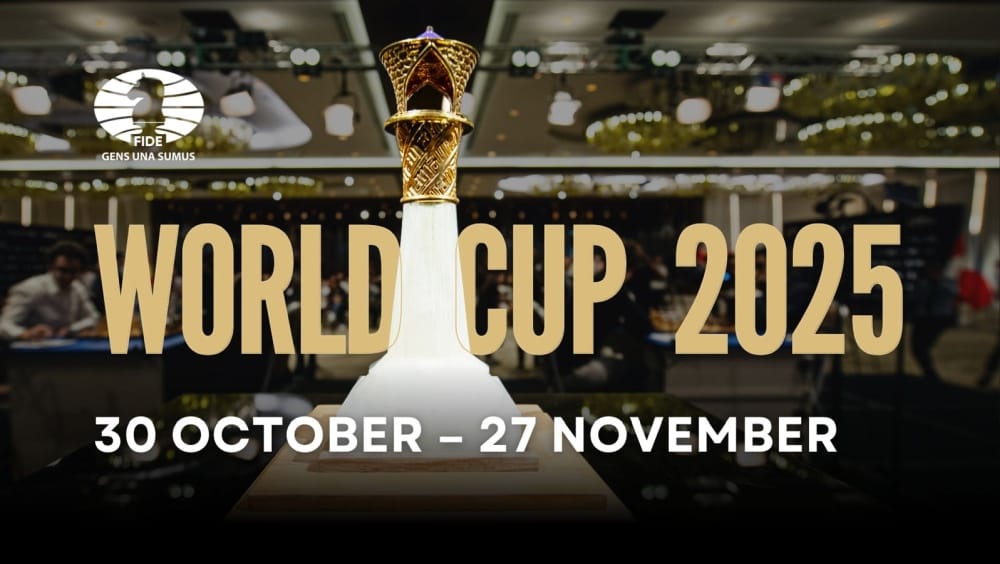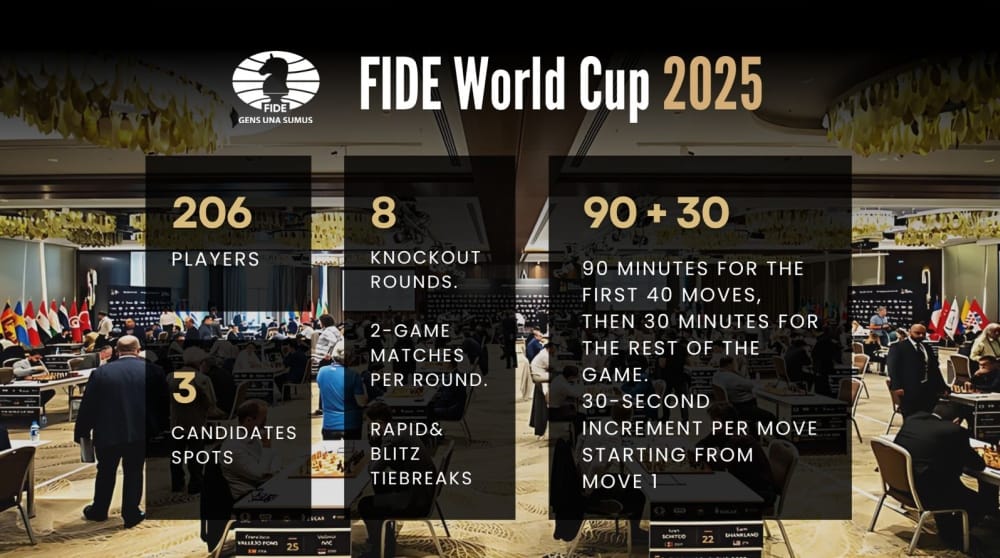Chess Returns Home: India to Host FIDE World Cup After 23 Years
India, the new chess superpower, is set to host the FIDE World Cup in Goa, a historic homecoming after 23 years.

Written by Lavanya, Intern, Allegedly The News
GOA, INDIA, August 27, 2025
Twenty-three years ago, a young Viswanathan Anand was at the peak of his powers, and India was a nascent but promising force on the global chess map. Today, that promise has been fulfilled, and the prophecy has come true. India stands as a bona fide chess superpower, and for the first time since 2002, the FIDE World Cup is returning to its ancient birthplace. The announcement that Goa will host the 2025 edition from October 31 to November 27 is more than just a logistical decision; it's a symbolic homecoming that has been decades in the making. This is a story of a sport, a nation, and a new generation of prodigies who are not just playing the game but rewriting its rules with every move.
The FIDE World Cup, a biennial knockout tournament, is one of the most brutal and revered events in the chess calendar. It’s a crucible where legends are forged and upsets are the norm. With a staggering prize pool of $2 million and three coveted spots in the 2026 Candidates Tournament, the final hurdle before challenging the World Champion, the stakes couldn't be higher.
The Rise of a Chess Powerhouse: A Timeline
India's journey from a chess periphery to a global powerhouse is a modern sporting fairy tale. The genesis of this revolution can be traced back to the late 1980s, when a then-18-year-old Viswanathan Anand became the country’s first Grandmaster. His success wasn't just a personal victory; it was a psychological breakthrough for the entire nation. Anand's five World Championship titles and his "Lightning Kid" style of play made chess a viable career path and inspired a generation. He showed that an Indian could not only compete with the best of the Soviet and European schools but could dominate them.
The seeds Anand planted have grown into a magnificent forest. Today, India boasts 89 Grandmasters (as of June 2025), a number that places it among the top chess nations in the world. According to FIDE, the average Elo rating of India's top 10 players is over 2725, second only to the United States. This surge isn't a fluke; it's the result of a deliberate ecosystem of dedicated coaches, competitive domestic tournaments, and, most importantly, the democratization of chess through online platforms.
The COVID-19 pandemic, ironically, supercharged this growth, as young players like Gukesh, Praggnanandhaa, and Arjun Erigaisi honed their skills on platforms like Chess.com and Lichess. The competitive environment they created, often playing against each other in countless online blitz matches, fueled a friendly but intense rivalry that has propelled them to the very top. As Praggnanandhaa himself admitted in a recent interview, the success of his peers, particularly Gukesh and Arjun, has served as a powerful inspiration rather than a source of insecurity. This shared journey and mutual respect among India's young stars are key factors in their collective success.
The timing of this World Cup is perfect, coming on the heels of India's unprecedented success in recent years. In a historic first, D. Gukesh became the World Chess Champion earlier this year, dethroning the legendary Ding Liren. Furthermore, India’s teams clinched gold in both the Open and Women’s categories at the last Chess Olympiad, and the young Divya Deshmukh won the Women's World Cup, sealing an all-Indian final against Koneru Humpy. This period of sustained success has cemented India's status and made it the natural host for a tournament of this magnitude.
The Significance of Hosting: Goa's Appeal
The choice of Goa as the host city is strategic and brilliant. While the state is internationally renowned for its stunning beaches, vibrant culture, and lively atmosphere, its selection for a global sporting event highlights a growing trend: the merging of sports and tourism. FIDE President Arkady Dvorkovich emphasized this, stating, “India has become one of the strongest chess nations, with outstanding players and passionate fans. After the success of the FIDE Women's World Cup held in Georgia earlier this year, we are proud to bring the FIDE World Cup to Goa. It will be a celebration of chess, and a unique experience for players and spectators from around the world.”
Beyond its natural beauty, Goa offers a robust infrastructure capable of handling a large-scale international event. The state has a wide array of high-quality hotels and resorts to accommodate players and officials, and its international airport ensures seamless travel for participants and fans from over 90 countries. The economic impact will be substantial, benefiting local businesses, hotels, restaurants, and tour operators. It's a symbiotic relationship: chess gets a beautiful and unique backdrop, and Goa gets to showcase itself as a multifaceted destination, capable of hosting not just parties and holidays, but world-class intellectual events. The state's recent focus on building sports-centric ecosystems and the development of new infrastructure, like the upcoming Shaktipeeth Expressway, only bolsters its case as a premier destination for sports tourism.
Inside the Tournament: Format, Players, and Prize Pool
The FIDE World Cup 2025 is a sprawling, high-octane event featuring 206 players. The format is a traditional, single-elimination knockout bracket, where every match is a fight for survival.
Tournament Structure
- Dates: October 31 to November 27, 2025
- Venue: Goa, India
- Format: 8-round knockout tournament.
- Participants: 206 players. The top 50 seeds, based on their FIDE ratings as of July 2025, receive a bye and start their campaign in the second round.
- Match Rules: Each match consists of two classical games. If the score is tied 1-1, a tie-break is played, starting with rapid games and, if needed, progressing to blitz games. This format ensures nail-biting finishes and tests a player's versatility across different time controls.
- Significance: The top three finishers—the winner, the runner-up, and the third-place winner—will earn spots in the prestigious 2026 Candidates Tournament, which is the gateway to a World Championship match.
Prize Pool Breakdown
The total prize fund for the tournament is an impressive $2,000,000, distributed among all players based on their performance. The breakdown is as follows:
- Winner: $120,000
- Runner-up: $85,000
- Third Place: $60,000
- Fourth Place: $50,000
- Eliminated in Round 6: 4 players, $35,000 each
- Eliminated in Round 5: 8 players, $25,000 each
- Eliminated in Round 4: 16 players, $17,000 each
- Eliminated in Round 3: 32 players, $11,000 each
- Eliminated in Round 2: 64 players, $7,000 each
- Eliminated in Round 1: 78 players, $3,500 each
The prize money, along with the high-stakes qualification for the Candidates, ensures that every match is fought with unyielding intensity.

The Lineup: Favorites, Rising Stars, and Indian Hopes
While the full lineup of 206 players is a constellation of talent, a few names stand out as potential champions and fan favorites.
Favorites to Win
- Magnus Carlsen: Although his participation is not yet confirmed, if the five-time former World Champion decides to play, he will be the undisputed favorite. Carlsen won the last World Cup in 2023 and is known for his unmatched endgame technique and strategic depth.
- Hikaru Nakamura: The American Grandmaster is a powerhouse in both classical and rapid chess. He is a popular figure due to his streaming and aggressive playing style, and his qualification for the 2026 Candidates Tournament is a major goal.
- Fabiano Caruana: The American Grandmaster is one of the most consistent players in the world. Known for his deep opening preparation and robust strategic play, he is a perennial threat in any tournament.
Indian Contenders
- D. Gukesh: The youngest World Champion in history, Gukesh is now the top-seeded Indian player. His calm demeanor and relentless accuracy make him a formidable opponent. The crowd will undoubtedly be rooting for their hometown hero, and his recent World Championship victory gives him a powerful psychological edge.
- R. Praggnanandhaa: The young prodigy who famously reached the final of the 2023 World Cup is a major star. His fearless, attacking style and ability to hold his nerve under pressure make him one of the most exciting players to watch.
- Arjun Erigaisi: Another member of India's new wave of Grandmasters, Arjun is known for his sharp calculations and creative play. He has steadily climbed the world rankings, reaching a peak Elo rating of over 2800 in the past year, and is a serious threat to any top player.
- Vidit Gujrathi: A seasoned Grandmaster and a consistent top-tier performer, Vidit brings a wealth of experience to the table. He is a tactically gifted player who can surprise opponents with his bold moves.
The depth of Indian talent means that fans can expect multiple Indian players to make a deep run in the tournament. In the last World Cup, India had four players in the quarterfinals, a record that could very well be surpassed in Goa.
Navigating the Coverage: How to Watch
For chess enthusiasts and new fans alike, following the World Cup has never been easier. FIDE, in partnership with various broadcasting channels and online platforms, is ensuring global access to the matches.
- Online Streams: The official FIDE YouTube channel and popular chess platforms like Chess.com and Lichess will provide live, expert-commentated streams. These broadcasts will feature analysis from top Grandmasters, interviews, and behind-the-scenes content.
- Official Website: The official FIDE World Cup 2025 website will have live boards, a real-time leaderboard, and an archive of all games.
- Broadcast Partners: In India, major sports networks and streaming services will likely carry the live coverage, making it accessible to millions.
Conclusion: A New Golden Era
The FIDE World Cup in Goa is more than a tournament; it is a testament to the growth of chess in India and a symbol of its cultural significance. The fusion of a traditional, cerebral game with a lively, tourist destination offers a unique model for future sporting events. This World Cup will undoubtedly be a celebration, not just of the game, but of India's remarkable journey as a chess nation. It’s a chance for the world to see the roots of the game thrive in the modern age, and for a new generation to be inspired by the battles on the 64 squares in the beautiful setting of Goa.
The Grand Questions
- A New Chess Order: With the stunning rise of Indian players and a new World Champion, do you believe the traditional chess order, long dominated by Russia and the United States, is now a thing of the past?
- The Goan Model: Can India successfully replicate this sports tourism model to host other major global sporting events, using its unique cultural and geographical diversity as a competitive advantage?
Sources
FIDE, All India Chess Federation, Chess.com, and news reports from various verified sources.




